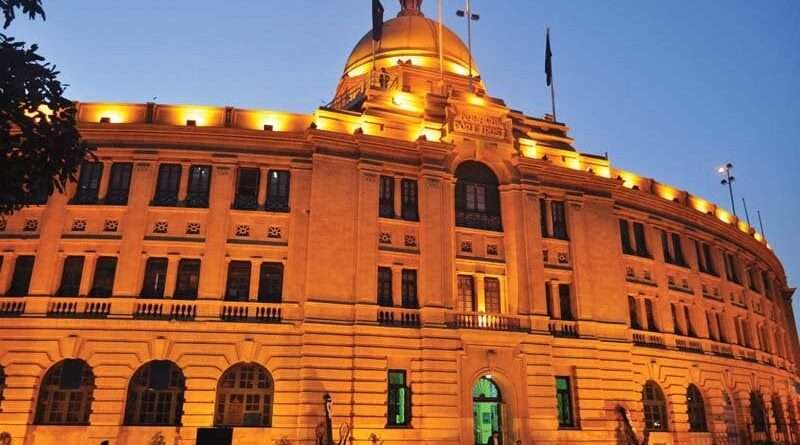Port Upgrades Urged to Boost Maritime Trade
|
Getting your Trinity Audio player ready...
|
Experts Call for Structural Changes and Technological Advancements to Enhance Trade Efficiency
Centenary celebrations were marked by the Karachi Port Trust authorities on Wednesday as 100 years were completed to the foundation of the port’s building on Tuesday. PHOTO: MUDASER KAZI/EXPRESS
Introduction
KARACHI: Experts emphasize that better port connectivity with inland container networks significantly improves services for local shippers and enhances port productivity and efficiency. As global maritime trade continues to rise, the need for substantial upgrades to Pakistan’s ports has become more pressing.
Current State of Maritime Trade
Seaborne trade remains the backbone of global commerce, with over 80% of trade volume carried by sea. In 2023, maritime trade grew by 2.4%, reaching 12,292 million tonnes, marking a recovery from a contraction in 2022. Despite uncertainties, there is optimism for continued growth.
The Need for Port Upgrades
Pakistan’s three main ports—Karachi Port Trust (KPT), Port Qasim Authority (PQA), and Gwadar Port Authority (GPA)—must seriously upgrade their facilities to handle the increasing seaborne trade. This includes:
- Implementing High-Tech Facilities: Introducing modern equipment and technology to improve efficiency.
- Reducing Port Fees: Making the ports more attractive and competitive for increased trade.
- Environmental Upgrades: Enhancing berths, planting mangroves, cleaning polluted water, and constructing a high-ceiling building at Groyne Yard.
Majyd Aziz, former president of the Karachi Chamber of Commerce and Industry (KCCI) and a ports and shipping expert, highlighted the necessity of allocating port resources for these important upgrades.
Challenges and Opportunities
Pakistan’s economy relies heavily on imports and growing exports. Efficient utilisation of its ports is crucial for economic growth. However, the private sector is often frustrated due to the inefficiencies at Karachi and Bin Qasim ports. Karachi port is frequently congested, leading to ships waiting at the outer anchorage and incurring heavy demurrage costs. Port Qasim faces similar issues, while Gwadar Port struggles to attract sufficient traffic.
Aziz pointed out that the involvement of numerous stakeholders across multiple jurisdictions creates opportunities for unethical practices, such as illicit payments. He advocates for reforming the KPT and PQA boards of trustees by including more port users rather than political appointees.
ALSO READ:
Proposed Reforms
Aziz proposed several reforms to improve port efficiency and reduce costs:
- Dividing Port Charges: Separating local costs (salaries, maintenance, repairs) from foreign outlay (foreign exchange expenses).
- Strict Monitoring and Accountability: Ensuring the proper use of tugs, pilot boats, dredgers, and other equipment to reduce maintenance costs.
- Structural Reforms: Addressing the entire maritime ecosystem to create a more efficient and transparent environment.
Global Trade and Supply Chain
Global trade is affected by disruptions at key maritime routes such as the Suez Canal, Panama Canal, Red Sea, and Black Sea, due to geopolitical and climate change issues. Reliable shipping is crucial for a stable supply chain, and it should not be compromised by contentious issues. Aziz urged world leaders to avoid using shipping routes as a strategy for political point-scoring.
Frequently Asked Questions (FAQs)
1. Why are port upgrades necessary for Pakistan?
Port upgrades are essential to handle increasing seaborne trade, improve efficiency, reduce costs, and enhance the competitiveness of Pakistan’s ports in the global market.
2. What are the main challenges faced by Karachi and Bin Qasim ports?
The main challenges include congestion, high demurrage costs, and inefficiencies due to the involvement of numerous stakeholders and opportunities for unethical practices.
3. How can port charges be reformed to reduce costs?
By dividing port charges into local costs and foreign outlay, it is possible to save on handling costs and benefit exporters, importers, and the government.
4. What impact do geopolitical and climate change issues have on global trade?
Disruptions at key maritime routes due to geopolitical and climate change issues can significantly affect global trade and supply chains, highlighting the need for reliable shipping routes.
5. What steps can be taken to improve port efficiency in Pakistan?
Steps include implementing high-tech facilities, reducing port fees, environmental upgrades, strict monitoring and accountability, and structural reforms in the maritime ecosystem.
Conclusion
In conclusion, Pakistan’s ports require significant upgrades to enhance efficiency and competitiveness in the global maritime trade. Implementing technological advancements, reducing costs, and addressing environmental concerns are crucial steps toward achieving these goals. By reforming port charges and ensuring strict monitoring and accountability, Pakistan can create a more efficient and transparent maritime ecosystem, benefiting its economy and global trade position.




